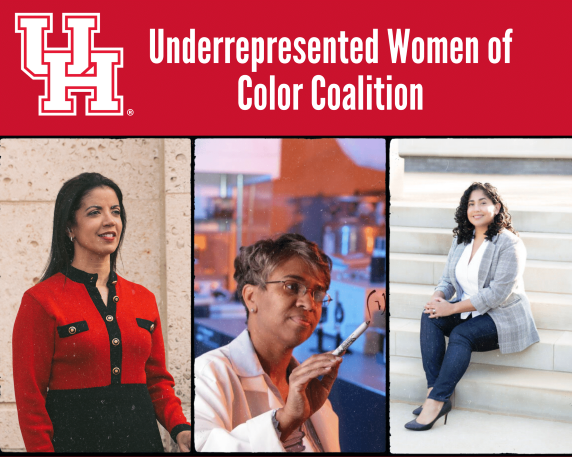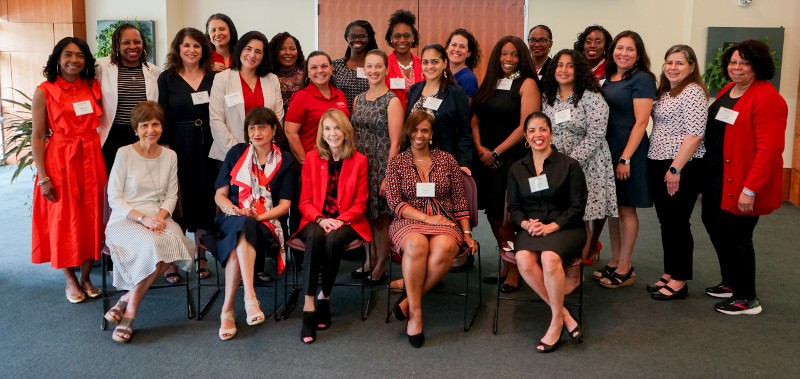Underrepresented Women of Color Coalition Supporting Professors' Professional, Personal Journeys
Campus Group Creating Community of Support for Women of Color Faculty
By Mike Emery, 713-743-7197
 Across the nation, approximately 700 colleges and universities are designated as Minority Serving Institutions, and more than 500 are recognized as Hispanic Serving Institutions. While increased diversity among U.S. students is often acknowledged and celebrated, that’s not always the case for faculty.
Across the nation, approximately 700 colleges and universities are designated as Minority Serving Institutions, and more than 500 are recognized as Hispanic Serving Institutions. While increased diversity among U.S. students is often acknowledged and celebrated, that’s not always the case for faculty.
Women of color, in particular, comprise just a small percentage of American faculty. Approximately 5.2% of U.S. faculty are Black women, and just 6.6% are Latinx. There are many factors challenging this population of the professoriate, but the University of Houston has launched an initiative aimed at supporting its women of color faculty.
The UH Underrepresented Women of Color Coalition is among the many initiatives launched by Senior Vice President of Academic Affairs and Provost Paula Myrick Short during her 10 years at the helm. The group, which welcomes all underrepresented minority tenured and tenure track women faculty members, serves to inspire and elevate its professoriate.
“I am very proud of this group and even more delighted to see how much it has grown since its inception,” said Short, who is retiring at summer’s end. “I know that it will continue to make an impact on our faculty, our university, and most importantly, our students.”
The coalition’s roots began during a lunchtime meeting between Short and Elebeoba May, associate professor and director of UH’s Biomedical Engineering Program. During their conversation, they discussed the many hurdles women of color face as faculty. Short and May also addressed the need for a community that would serve as both a sounding board and support group for professors.
The Underrepresented Women of Color Coalition was officially launched in 2017 with May as one of its first leaders. Other founding leaders included Norma Olvera, professor of psychological, health, and learning sciences; Donna Stokes, professor of physics; and Consuelo Arbona, professor of counseling psychology.

“Women of color face unique challenges in higher education,” said Stokes. “Across most academic disciplines, we experience things such as microaggressions that can be both distracting from our work and disheartening at times. And in STEM fields, we often aren’t valued for what we can bring to the table … or even provided the opportunity to sit at the table.”
To Stokes’ point, there is a scarcity of Black and Latinx women faculty in STEM fields, and a recent study suggests that women of color contend with lack of inclusion and recognition compared to male and white counterparts.
Through the coalition, Stokes and others have bonded with each other by sharing their experiences within the academy. In essence, the group provides professors with opportunities to build community, advance their research, and work toward dismantling the inequities that impact women of color faculty experiences. The group hosts monthly meetings and an annual retreat.
“It really provides a safe space, where we can discuss topics we may not be able to talk about in other environments,” Stokes said. “We can come to each other for support, guidance, and mentorship.”
The group also facilitates professional development programming focused on activities such as academic writing, promotion and tenure, and other topics relevant to their professional and personal journeys as faculty.
According to Stokes, a popular professional development activity is its “Writing Hours,” which has been critical to faculty development and helps foster an environment where coalition members can thrive.
Amanda Ellis, associate professor of English, is an advocate of these “Writing Hours” and adds that the group empowers and encourages faculty to seek growth opportunities.
“The URWOCC has had a profound impact on me as a researcher. It has served as a surrogate space of community and empowerment and a lifeline for me since my start here at the University of Houston five years ago,” she said.
Through the coalition’s support, Ellis achieved early tenure. She also earned the Ross M. Lence Award for Teaching Excellence and a Faculty Excellence Award—receiving both awards at an early stage in her academic career. The coalition also awarded a grant to Ellis, which helped defray the cost of the cover art on her recent book, “Letras y Limpias: Decolonial Medicine and Holistic Healing in Mexican American Literature” (Arizona University Press).
The group, she said, offers and a “crucial mechanism” for tenured and tenure-track women of color at the University.
In just five years, the Underrepresented Women of Color Coalition membership has increased by 24% (from 55 members in 2017 to 68 in 2022). Group members have reported that the coalition has been so advantageous for them that it is a key reason why they have chosen to remain at UH rather than entertain job offers from other universities.
Based within the Office of Faculty Recruitment, Retention, Equity, and Diversity (under the Office of the Provost), the coalition continues to make progress, shatter glass ceilings, and raise the bar for other universities across the nation.
“This group is making a difference at the University of Houston and serves as a model for other institutions of higher education,” said Erika Henderson, associate provost of Faculty Recruitment, Retention, Equity, and Diversity. “Too often, women of color are challenged by the very environments they are sworn to serve. The coalition we have built is focused on overcoming obstacles and promoting inclusivity within our faculty ranks, but more than that, it is about creating a community of scholars focused on supporting each other and our University.”
A video presented at a special tribute for Provost Short is linked here with statements and anecdotes from its members.